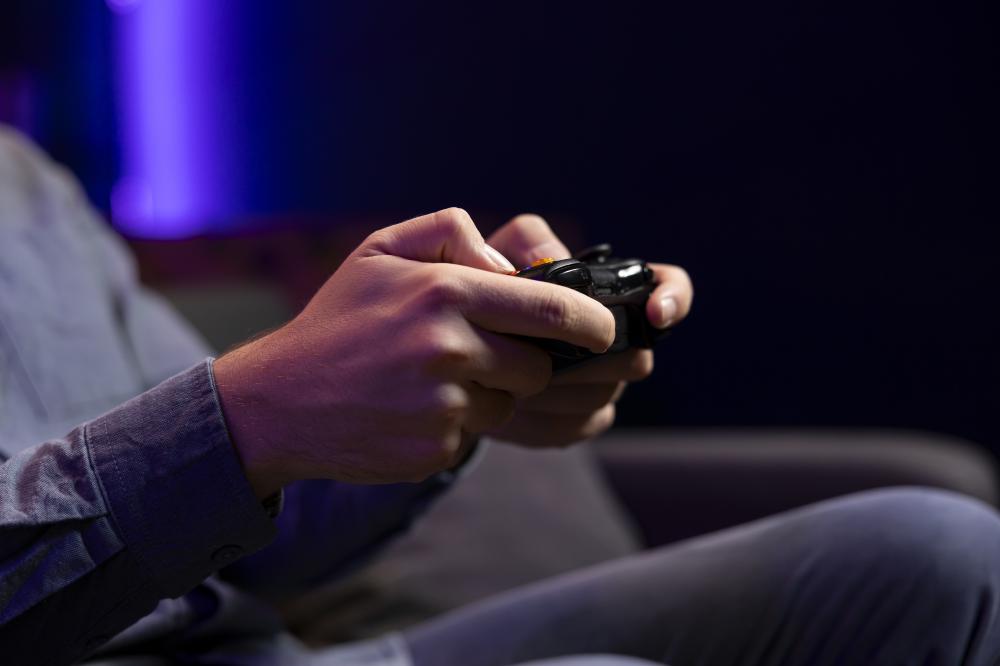Los Angeles Video Game Addiction Treatment

Los Angeles Video Game Addiction Treatment
Video game addiction is a concern that impacts individuals and families across Los Angeles, bringing unique challenges to the forefront of mental health and wellness. At Thrive Treatment℠, we address this growing issue with tailored programs and a compassionate approach, placing emphasis on healing the individual as a whole.
Recognizing Video Game Addiction
Addiction to video games can manifest in various ways, affecting different facets of an individual’s life. It’s crucial to recognize these signs early on to seek appropriate help. Symptoms include an inability to control gaming habits, prioritization of gaming over other life activities, and continued gaming despite negative consequences.
Symptoms to Watch For
- Preoccupation with gaming
- Withdrawal from family and friends
- Neglect of personal and professional responsibilities
- Use of gaming as a coping mechanism for negative emotions
Treatment Options at Thrive Treatment℠
At Thrive Treatment℠, we offer a comprehensive range of services to address video game addiction. Our programs are designed to provide individuals with the skills and tools they need to reclaim control over their lives and find healthier ways to cope with stress and anxiety.
In-Person and Virtual Therapy
We understand the importance of flexibility in treatment, which is why we provide both in-person therapy at our facilities in Santa Monica, Woodland Hills, and Culver City, as well as virtual telemedicine options. This allows clients to access our services in a manner that best suits their needs and lifestyles.
Individual and Group Sessions
Therapy sessions at Thrive Treatment℠ are tailored to the individual, incorporating both one-on-one counseling and group therapy. These sessions are designed to explore the underlying reasons for the addiction, while also fostering a sense of community and shared understanding among clients.
A Holistic Approach to Recovery
Treating video game addiction requires more than just addressing the compulsion to play; it involves healing the whole person. Our holistic approach includes mindfulness practices, physical wellness, and nutritional guidance to support overall mental and physical health.
Supporting Families in the Healing Process
Recovery is a journey that often requires the support and understanding of loved ones. We offer family therapy sessions and educational programs to help family members become proactive supporters of their loved one’s recovery process.
Overcoming Challenges Together
The road to recovery from video game addiction is not always straightforward. At Thrive Treatment℠, we stand by our clients every step of the way, offering encouragement, professional guidance, and the tools necessary to overcome addiction.
Client Testimonials
Our greatest endorsements come from the individuals and families whose lives have been transformed by our services. These stories of hope and healing highlight the effectiveness of our approach to treating video game addiction.
Get Started With Us Today
Los Angeles Video Game Addiction Treatment at Thrive Treatment℠ is available to help you or your loved one start on the path to recovery. Reach out to our dedicated team to learn more about our programs and how we can tailor our services to meet your needs.

Where can you find help if you are addicted to gaming?
If you’re struggling with video game addiction, know that you’re not alone. In Los Angeles, help is available at specialized treatment centers like Thrive Treatment℠. We offer a range of services designed to address addiction’s unique challenges. Our approach includes both in-person and virtual therapy sessions, allowing you to choose the option that best fits your lifestyle. Additionally, we provide individual and group counseling, helping you understand the root causes of your addiction while developing healthier coping mechanisms.
How is video game addiction treated?
Treatment for video game addiction often involves a multi-faceted approach that focuses on the individual’s specific needs. At Thrive Treatment℠, we combine traditional therapy methods with innovative techniques to address both the psychological and physical aspects of addiction. This might include cognitive-behavioral therapy, family counseling, mindfulness practices, and lifestyle changes such as improved nutrition and physical exercise. Our goal is to help individuals build a balanced life where gaming no longer serves as the primary coping mechanism.
How to get rid of gaming addiction?
Getting rid of gaming addiction requires a commitment to change and the right support. Start by acknowledging the problem and seeking help from professionals who understand this specific form of addiction. At Thrive Treatment℠, we work with you to create a personalized treatment plan that includes setting realistic goals, finding alternative activities to gaming, and building a support network of friends, family, and peers who understand your journey. Remember, recovery is a process, and it’s okay to seek help along the way.
What to do if I have a gaming addiction?
If you believe you have a gaming addiction, the first step is to reach out for help. Contacting a professional treatment center like Thrive Treatment℠ can provide you with the resources and support needed to start your recovery journey. It’s also helpful to communicate with friends and family about your struggles, as they can offer additional support and understanding. Importantly, take it one day at a time and recognize that every step forward is progress in your journey towards a healthier, more balanced life.
How can family members support a loved one struggling with video game addiction?
Supporting a loved one through video game addiction can be challenging, but it’s crucial for their recovery. Family members can start by educating themselves about the addiction, which helps in understanding what the addicted person is going through. Being patient and non-judgmental is key, as is encouraging the individual to seek professional help. At Thrive Treatment℠, we offer family therapy sessions aimed at improving communication and understanding within the family dynamic. Additionally, setting healthy boundaries and participating in activities together that don’t involve gaming can strengthen relationships and support the recovery process.

